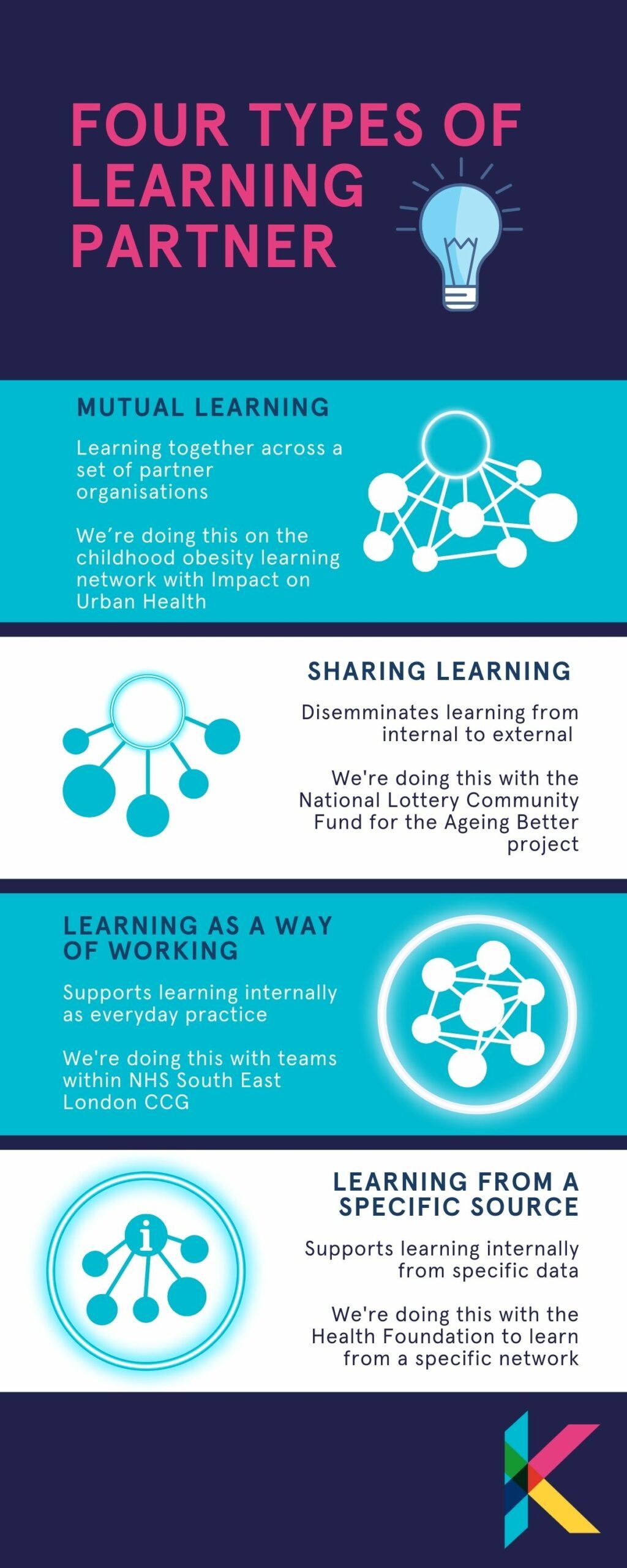How a learning programme can help you improve
A significant part of our work involves supporting health and social care organisations to design and deliver learning programmes. But the term ‘learning programme’ is quite hard to define. Lydia Paris breaks down how we help organisations to use learning to improve what they do.
Learning is a good thing for individuals and for organisations. Most people probably agree that using learning to make improvements is vital.
But why should anyone employ a consultant to help with learning? Well, there are generally three reasons why our clients need a learning partner:
- To deal with complexity and volume of learning.
Learning is complicated, it involves collecting lots of information, filtering it and making it useful. At Kaleidoscope we help people, teams and organisations to gather and make sense of large and complex learning information and use it to drive change. - To disseminate learning and drive change.
Learning that goes unnoticed won’t change anything. We help package and share learning in ways that will effectively influence policy and practice, whether it is being internally or externally shared. - To provide independent, expert support for learning.
How do you uncover learning that you’ve not found before? That is where some outside support can help. We provide independent, expert support and advice on bringing people together in a psychologically-safe way to share and make sense of learning.
A good learning programme involves gathering insights, understanding and making sense of those insights, and improving things as a result.
A learning model to meet your needs
A good learning programme involves gathering insights, understanding and making sense of those insights, and improving things as a result. However, the key players and best model for doing that can vary depending on the aims of the learning programme.
There are four common models of learning programme (see image below) that we provide support for:
Mutual learning: learning together across a set of organisations or individuals.
Here the onus is on reflective and problem-centred learning between people in psychologically-safe spaces. The learning may benefit each individual or the group as a collective. We did this in our work with the British Red Cross and Co-op partnership, bringing together 40 of their Community Connector services to learn from each other to improve their practice.
Learning from a specific source: learning internally from specific data or examples.
This focuses on learning from other sources, such as data or external peers. In the Changing Healthcare programme, we ran four events centring on different examples of successful, large-scale change in the NHS. The events helped those working in, or thinking about, improvement and system change within the NHS to do their work more effectively.
Shared learning: disseminating learning from internal to external
Here, the onus is on generating shared learning to influence others to have an ‘external effect’ – for example, influencing the wider policy environment. With the National Lottery Community Fund’s six-year Ageing Better programme we are supporting local partners on the programme to share learning they have gained with external policy makers, funders and practitioners.
Learning as a way of working: supporting learning internally as everyday practice.
This is about enabling a learning culture within an organisation or system. We worked with Guy’s and St. Thomas’ Charity to develop an internal framework that helps them collect, collate, interpret and share insights and lessons to maximise the value gained from their three urban health programmes.
The starting point for us is always to find what good learning looks like for a programme.
Our approach to supporting learning programmes
We put collaboration, joy and kindness at the forefront of all our work, and learning programmes are no exception. The starting point for us is always to find what good learning looks like for a programme. Once we have that, we can start to create a basic learning infrastructure. Often that will be something like an online space or a framework to collect, collate, interpret and share insights.
Gathering learning is a collaborative effort. For us, it often revolves around action learning sets, desk research, interviews, focus groups, surveys, learning events and workshops.
Any and all of these methods will be used depending on what is required. But learning is a two way street, so it’s not just about collecting information – we also have to identify the audiences we need to share the learning with.
Capturing key learning
We write reports that capture key learning and make recommendations to stakeholders, whether internal or external. But there are limitations to the reach and impact of a report alone. So, as a learning partner, we often collate and share insights and recommendations using other methods, such as videos and blogs.
We also run learning events – both digital and face-to-face, large and small – to connect stakeholders and to keep the learning experience interesting and engaging.
I hope this clarifies what learning programmes are, and how we do them at Kaleidoscope. If you have any questions about our work in this area, please get in touch.

 Lydia Paris22 April 2021
Lydia Paris22 April 2021

Comments